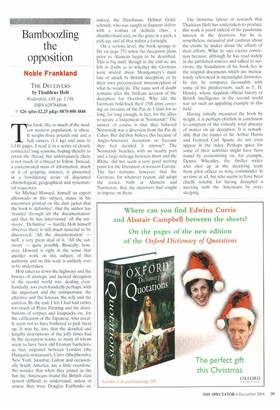Bamboozling the opposition
Noble Frankland
THE DECEIVERS by Thaddeus Holt Kidenfeld, £30, pp. 1,148, ISBN 0297848046 it £26 (plus £2.25 p&p) 0870 800 4848 This book, like so much of the modern western population, is obese. It weighs three pounds one and a half ounces (1.4 kg) and runs to 1,148 pages. I read it in a series of closely connected long sessions, hoping thereby to retain the thread, but unfortunately there is not much of a thread to follow. Instead, a concentrated mass of information, much of it of gripping interest, is presented in a bewildering series of disjointed chronological, geographical and systematical sequences.
Sir Michael Howard, himself an expert aficionado in this subject, states in his encomium printed on the dust jacket that the book is 'definitive', that the author has 'trawled through all the documentation' and that he has interviewed 'all the survivors'. 'Definitive' — hardly; Holt himself observes there is still much material to be discovered. 'All the documentation' — well, a very great deal of it. 'All the survivors' — quite possibly. Basically, however, Howard is right in the sense that another work on this subject, of this authority and on this scale is unlikely ever to be undertaken.
Holt takes us down the highways and the byways of strategic and tactical deception in the second world war, dealing evenhandedly, too even-handedly perhaps, with the important and the unimportant, the effective and the fatuous, the wily and the careless. By the end, I felt I had had rather too much of Peter Fleming and his distributions of corpses and knapsacks etc. for the edification of the Japanese, who usually seem not to have bothered to pick them up. It may be, too, that the detailed and lengthy descriptions of the jolly times had by the deception teams, so many of whom seem to have been old Etonian bachelors, as they migrated between London (the Hungaria restaurant), Cairo (Shepheards), New York, Istanbul, Lisbon and occasionally South America, are a little overdone. No wonder that when they joined in the fun the Americans found the British class system difficult to understand, unless of course they were Douglas Fairbanks or,
indeed, the Dutchman, Helmut Goldsehmidt, who was caught in flagrante delicto with a woman of 'definite class', a chambermaid and, on the grass in a park, a pick-up, and all that within a fortnight.
On a serious level, the hook springs to life on page 253 when the deception plans prior to Alamein begin to be described. This is big stuff, though in the end we are left in doubt as to whether the Germans were misled about Montgomery's main line of attack by British deception, or by their own preconceived misconception of what he would do. The same sort of doubt remains after the brilliant account of the deception for Overlord. Why did the Germans hold back their 15th army covering an invasion of the Pas de Calais for so long, for long enough, in fact, for the allies to secure a lodgement in Normandy? The answer of course is that they believed Normandy was a diversion from the Pas de Calais. But did they believe this because of Anglo-American deception or because they had decided it anyway? The Normandy beaches, with no nearby port and a large mileage between them and the Rhine, did not seem a very good starting point for the liberation of western Europe. The fact remains, however, that the Germans, for whatever reason, did adopt the stance, both at Alamein and Normandy, that the deceivers had sought to impose on them.
The immense labour of research that Thaddeus Holt has undertaken to produce this work is proof indeed of his passionate interest in the deceivers, but he is, nonetheless, measured and cautious about the claims he makes about the effects of their efforts. What he says carries conviction because, although he has read widely in the published sources and talked to survivors, the foundation of his book lies in the original documents which are meticulously referenced in meaningful footnotes. In this he compares favourably with some of his predecessors, such as F. H. Hinsley, whose slapdash official history of British intelligence in the second world war set such an appalling example in this field.
Having initially measured the book by weight, it is perhaps churlish in conclusion to complain of the virtually total absence of matter on air deception. It is remarkable that the names of Sir Arthur Harris and General Carl Spaatz do not even appear in the index. Perhaps space for some of their activities might have been found by economising on, for example, Dennis Wheatley, the thriller writer who shot up in the deceiving team from pilot officer to wing commander in no time at all, but who seems to have been chiefly notable for having disrupted a meeting with the Americans by oversleeping.


















































































 Previous page
Previous page